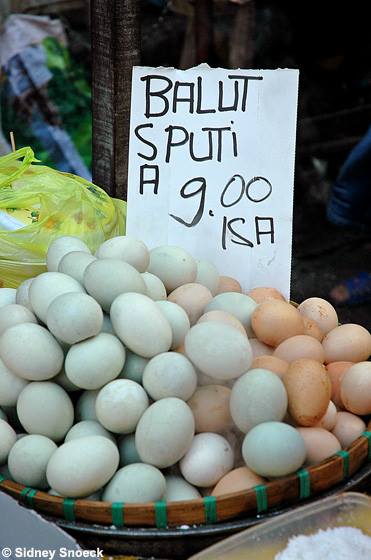
There, nearly half of the community of duck raisers and balut manufacturers has folded up. Most of the duck raisers in Pateros point to the culprit: the dying waters of Laguna de Bay. And another: the high costs of artificial feeds to which duck raisers have resorted to because of the deteriorating state of Laguna de Bay.
Right now in city neighborhoods, the distinctive voice of the midnight balut vendor selling like a town crier his boiled duck eggs can hardly be heard. This is unlike in the past when one could spot a balut vendor sitting near the corner of a sari-sari store or the jeepney/bus terminal. People from all walks of life would gather around the balut vendor and buy the delicacies carefully tucked inside his basket of goodies: balut, penoy, boiled peanuts and chicharon dipped in spicy vinegar or sprinkled with rock salt.
Balut, a boiled duck egg with its little black chick curled inside, can be roasted by burying it in burning rice husks. In balut-making, the unfertilized eggs are removed and sold as boiled penoy. A popular variation is the balut sa puti with a more developed chick, with its feathers, beak and soft bones.
What is happening to the balut vendors and the balut industry that provides them with a livelihood? To find answers to these questions, this reporter decided to visit one of the main sources of duck eggs in Metro Manila, a place where ducks are still raised and fed to produce this distinctively Filipino delicacy – Pateros. Pateros is popular among delicacy lovers as balut country.
Mang Rufino Capco, is a businessman who manages the R & M Balut Industry. Mang Rufino, who has been in the balut trade since the 1960s said he is not yet ready to give up on his duck egg business, something his contemporaries have decided to do for the past several years.
“As selling ducks was no longer profitable and the costs of production were increasing, several duck raisers decided to sell their ducks to interested buyers,” Mang Rufino said. “Before, the cost of fresh duck eggs used to be lower than they cost today. Today, many duck raisers are losing money and are not earning any profit even though they have fresh duck eggs to sell to customers.”
In terms of market profitability, balut or duck eggs has an average saleable price of P15, higher than the prices of regular eggs which range from P5 to P7 only.
Mang Rufino also pointed to the present state of Laguna de Bay, where the population of the ducks’ natural food—aquatic shells and snails—have declined due to the worsening water pollution in the lake.
He also stressed that duck raisers would generally feed their ducks natural palay, aquatic shells and snails. Come harvest time and the rainy season, duck raisers would bring their ducks to the rice fields to feast on the snails, shells and insects. This would mean less expense for the duck raisers.
Today, most duck raisers have abandoned the natural way of feeding and have opted for the high-tech way, feeding them duck feeds and duck pellets manufactured by Robina, B-Meg and other animal feeds producers. Because of this, expenses of duck raisers have gone up.
Almost half of the balut businesses based in Pateros have closed down because of these factors. There are also many places in the province of Laguna where a lot of kamaligs (poultry/duck house made of nipa and bamboo) are now empty of ducks because of the hard times that have befallen most of the duck raisers.
But Mang Rufino was happy to say that the past couple of years have been good for the balut makers of Pateros because their ducks produced a lot of eggs. Every day, he would supply duck eggs to the balut vendors who would troop to his doorstep.
Mang Rufino, like all other balut makers, finds it difficult to stretch the monthly income that they earn to buy much-needed materials for their balut business. He said that most of the balut makers in Pateros have experienced one problem after another so they decided to give up on the business. Because of the high cost of materials used in the raising of ducks, they realize they cannot gain any profit anymore.
“But the reason why I haven’t given up or quit the balut business is that I pity the balut vendors who trust me and rely on me for their daily supply of duck eggs. Without my help, they will surely lose their only means of earning a decent living,” said Mang Rufino.
By Jose K. Lirios
